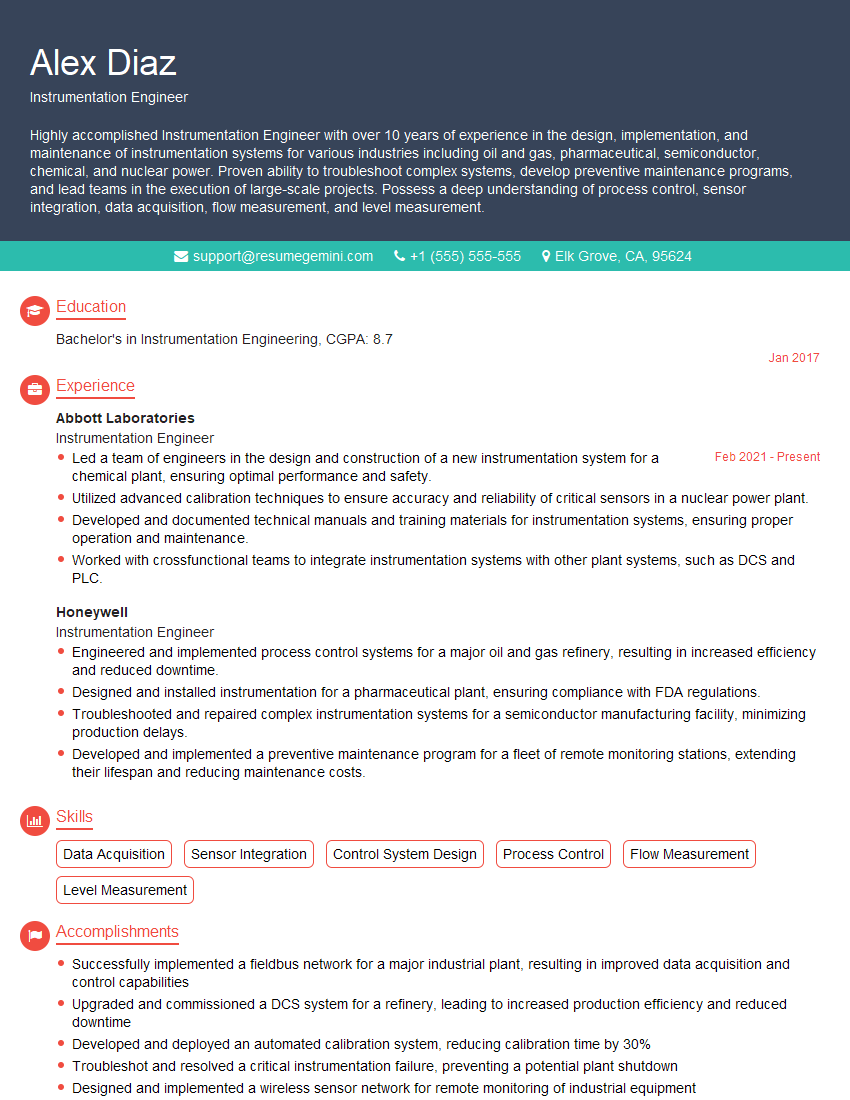Are you a seasoned Instrumentation Engineer seeking a new career path? Discover our professionally built Instrumentation Engineer Resume Template. This time-saving tool provides a solid foundation for your job search. Simply click “Edit Resume” to customize it with your unique experiences and achievements. Customize fonts and colors to match your personal style and increase your chances of landing your dream job. Explore more Resume Templates for additional options.

Alex Diaz
Instrumentation Engineer
Summary
Highly accomplished Instrumentation Engineer with over 10 years of experience in the design, implementation, and maintenance of instrumentation systems for various industries including oil and gas, pharmaceutical, semiconductor, chemical, and nuclear power. Proven ability to troubleshoot complex systems, develop preventive maintenance programs, and lead teams in the execution of large-scale projects. Possess a deep understanding of process control, sensor integration, data acquisition, flow measurement, and level measurement.
Education
Bachelor’s in Instrumentation Engineering
January 2017
Skills
- Data Acquisition
- Sensor Integration
- Control System Design
- Process Control
- Flow Measurement
- Level Measurement
Work Experience
Instrumentation Engineer
- Led a team of engineers in the design and construction of a new instrumentation system for a chemical plant, ensuring optimal performance and safety.
- Utilized advanced calibration techniques to ensure accuracy and reliability of critical sensors in a nuclear power plant.
- Developed and documented technical manuals and training materials for instrumentation systems, ensuring proper operation and maintenance.
- Worked with crossfunctional teams to integrate instrumentation systems with other plant systems, such as DCS and PLC.
Instrumentation Engineer
- Engineered and implemented process control systems for a major oil and gas refinery, resulting in increased efficiency and reduced downtime.
- Designed and installed instrumentation for a pharmaceutical plant, ensuring compliance with FDA regulations.
- Troubleshooted and repaired complex instrumentation systems for a semiconductor manufacturing facility, minimizing production delays.
- Developed and implemented a preventive maintenance program for a fleet of remote monitoring stations, extending their lifespan and reducing maintenance costs.
Accomplishments
- Successfully implemented a fieldbus network for a major industrial plant, resulting in improved data acquisition and control capabilities
- Upgraded and commissioned a DCS system for a refinery, leading to increased production efficiency and reduced downtime
- Developed and deployed an automated calibration system, reducing calibration time by 30%
- Troubleshot and resolved a critical instrumentation failure, preventing a potential plant shutdown
- Designed and implemented a wireless sensor network for remote monitoring of industrial equipment
Awards
- ISA Certified Automation Professional (CAP)
- Certified Functional Safety Professional (CFSP)
- Recognized for Excellence in Instrumentation Design and Implementation
Certificates
- Certified Measurement and Control Professional (CMCP)
- Certified Instrumentation Engineer (CIE)
- Certified Control Systems Technician (CCST)
- Certified Maintenance and Reliability Technician (CMRT)
Career Expert Tips:
- Select the ideal resume template to showcase your professional experience effectively.
- Master the art of resume writing to highlight your unique qualifications and achievements.
- Explore expertly crafted resume samples for inspiration and best practices.
- Build your best resume for free this new year with ResumeGemini. Enjoy exclusive discounts on ATS optimized resume templates.
How To Write Resume For Instrumentation Engineer
- Highlight your expertise in specific industry-related software and technologies.
- Showcase your ability to work independently and as part of a team.
- Quantify your accomplishments with specific metrics and results.
- Proofread your resume carefully for any errors in grammar or spelling.
Essential Experience Highlights for a Strong Instrumentation Engineer Resume
- Designed and implemented control systems for process optimization and downtime reduction.
- Ensured compliance with FDA regulations in the design and installation of instrumentation systems.
- Troubleshooted and resolved complex instrumentation issues to minimize production delays.
- Developed and executed preventive maintenance programs to enhance system lifespan and reduce costs.
- Led a team of engineers in the design and construction of a new instrumentation system, ensuring optimal performance and safety.
- Applied advanced calibration techniques to guarantee accuracy and reliability of critical sensors.
- Authored technical manuals and training materials for instrumentation systems to facilitate proper operation and maintenance.
Frequently Asked Questions (FAQ’s) For Instrumentation Engineer
What are the essential skills for an Instrumentation Engineer?
Essential skills include proficiency in process control, sensor integration, data acquisition, flow measurement, level measurement, and control system design.
What industries employ Instrumentation Engineers?
Instrumentation Engineers are employed in various industries, including oil and gas, pharmaceutical, semiconductor, chemical, and nuclear power.
What is the career path for an Instrumentation Engineer?
The career path typically involves starting as an entry-level engineer and progressing to roles with increasing responsibility, such as project engineer, lead engineer, and ultimately management positions.
What is the job outlook for Instrumentation Engineers?
The job outlook is expected to be favorable due to the increasing demand for automation and instrumentation in various industries.
What are the key responsibilities of an Instrumentation Engineer?
Key responsibilities include designing, implementing, and maintaining instrumentation systems, troubleshooting and resolving issues, developing preventive maintenance programs, and ensuring compliance with industry regulations.
What are the educational requirements for an Instrumentation Engineer?
Typically, a Bachelor’s degree in Instrumentation Engineering or a related field is required.